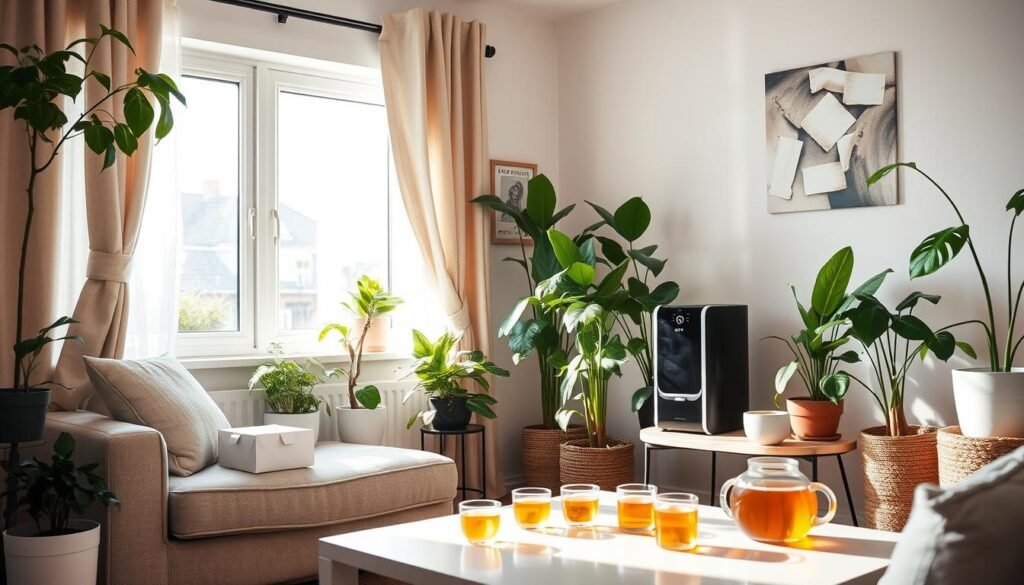Every year in the United States, more than 60 million people are affected by seasonal allergies. This often leads to a condition known as allergy fatigue. It makes you feel extremely tired and without energy. People are now finding allergy fatigue solutions that offer natural relief and require changing some lifestyle habits.
This guide will highlight several methods to fight off allergy-induced fatigue. It’s all about finding what triggers your allergies and making small, manageable changes. By doing this, you can feel more energetic during allergy season. Understanding the relationship between allergies and fatigue is key. It helps you find the best ways to deal with symptoms and get your energy back.
Key Takeaways
- Allergy fatigue is often linked to the body’s immune response to allergens.
- Hydration plays a crucial role in alleviating allergy symptoms.
- Vitamin C-rich foods boost the immune system, helping combat allergies.
- Quercetin, a natural anti-inflammatory, may regulate histamine levels.
- Implementing sinus rinses can help relieve nasal congestion caused by allergies.
- Improving overall lifestyle habits can significantly reduce allergic fatigue.
- Effective air filtration systems can help mitigate allergen exposure.
Understanding Allergy-Induced Fatigue
Allergy-induced fatigue is more than feeling tired. It sticks around, even after you sleep well. Your body fights allergens like pollen, dust, and pet fur. This fight makes you feel exhausted.
Symptoms like stuffy noses, sneezing, and itchy eyes make sleeping hard. Poor sleep means you feel more tired during the day. Knowing how allergies make you tired is the first step to managing it. Many people deal with allergies all year, showing how big this issue is.
Treating your allergies can help you feel less tired. Medicines like antihistamines and nasal sprays work well for many. But, be careful because some can make you sleepy. Picking the right medicine is key. Allergy tests can find out what bothers you. By avoiding these things, you might sleep better. In short, understanding allergy fatigue and how your body reacts is important for your health.
What Causes Allergy Fatigue?
Allergy fatigue comes from our body fighting off substances it sees as threats. Histamine response is key in this battle. When allergens like pollen or pet dander invade, our bodies release histamines. This can cause inflammation and mess with our sleep, making us tired.
Those with allergy fatigue often find sneezing, itching, and a blocked nose gets in the way of daily life. The link between these symptoms and feeling wiped out is strong. It’s because our immune system is working overtime. Around 30% of people face seasonal allergies, not realizing how much it drains their energy and focus.
Allergic reactions can cause ongoing inflammation, leading to fatigue or even depression. Also, common allergy meds, like Benadryl, can make you sleepy. Knowing what causes allergy fatigue is the first step to tackle it.
Seeing an allergist is critical for getting to know what triggers your allergies. They might suggest allergy shots or tests to find out what you’re allergic to. Finding the right treatment plan can cut down on tiredness and improve life. For more tips on handling allergy fatigue, visit this resource.
Identifying Common Allergens That Cause Fatigue
It’s key to know which Common Allergens make you tired for better control. These allergens play a big role in feeling worn out and affect life quality.
Pollen is a biggie during spring and summer. It causes sneezing, itchy eyes, and makes you tired. Dust Mites are tiny but mighty, living in your home and making you tired all year. You might get congested from them.
Pet Dander is a major concern for pet owners. It leads to sneezing and stuffiness. Being around pets can make you more tired, especially if you’re already sensitive. Knowing how these allergens affect you is the first step to feeling better.
Mold is yet another allergen causing tiredness. It loves moist places, so keeping your home dry is crucial. It can make you feel similar to when you’re around Pollen and Dust Mites.
Don’t forget about food allergies; they are important too. Certain foods might cause big problems, making you tired. Writing down how foods affect you can show which ones to stay away from.
Getting help from an allergist is sometimes necessary to pinpoint your triggers. Avoiding what causes your allergies can make you less tired and improve your life. For tips on managing allergies and reducing fatigue, check out natural remedies for adrenal fatigue.
| Allergen | Common Symptoms | Management Strategies |
|---|---|---|
| Pollen | Sneezing, runny nose, fatigue | Avoid outdoors during peak seasons, use air purifiers |
| Dust Mites | Congestion, itchy eyes, fatigue | Wash bedding weekly, use hypoallergenic covers |
| Pet Dander | Sneezing, swelling, fatigue | Limit pet access to certain areas, groom pets regularly |
| Mold | Coughing, itchy eyes, fatigue | Control indoor humidity, repair leaks |
| Food Allergies | Swelling, hives, fatigue | Avoid trigger foods, carry antihistamines |
How to Reduce Allergy-Induced Fatigue
Feeling tired from allergies can be tough. There are ways to help reduce this tiredness. Drinking lots of water, eating foods rich in certain nutrients, and taking natural supplements can all help.
Stay Hydrated
Drinking enough water is key to fighting off allergy tiredness. When you don’t drink enough, your body produces more histamine. This can make your allergy symptoms worse. So, drinking water throughout the day helps with both symptoms and your energy levels.
Being well-hydrated helps your body work better and keeps you alert.
Incorporate Vitamin C-Rich Foods
Eating foods high in Vitamin C is good for your immune system and can reduce allergy inflammation. Foods like citrus fruits, strawberries, and bell peppers are packed with Vitamin C. Eating these regularly can help your body fight allergens and cut down on allergy tiredness.
Utilize Quercetin for Allergies
Quercetin is an antioxidant in many fruits and veggies. It helps control histamine release and supports healthy breathing. Foods like onions, apples, and broccoli have lots of quercetin. Adding these to your diet can naturally help with allergies.

Natural Remedies for Allergy Fatigue
Managing allergy fatigue can get easier with natural remedies. These methods aim to lessen symptoms and boost comfort in everyday life.
Sinus Rinses and Nasal Irrigation
Sinus rinses clear your nasal paths and cut down swelling. They use saline to wash out allergens and mucus, making breathing easier. For those with constant allergies, using Sinus Rinses every day helps reduce nasal congestion and drips.
Honey and Propolis Benefits
Honey can naturally ease allergy symptoms, thanks to its possible anti-inflammatory effects. Propolis for Allergies, from honey, might also help with allergic reactions. But, talk to your doctor before trying them, particularly if allergic to bees.
Using natural remedies can enhance life quality for those with allergy fatigue. Combining sinus rinses with honey or propolis offers a complete way to fight allergy fatigue. To learn more, check out natural allergy remedies for additional options.
Allergy Management Tips for Daily Life
Managing allergies well is key to feeling less tired and improving your health. Small changes in your day-to-day life can really help. Here are some tips to become more aware of how to manage allergies. They cover Allergy Management Tips, ways to Improve Sleep Hygiene, and Lifestyle Changes to fight Allergic Exhaustion.
Improving Sleep Hygiene
Good sleep is very important for people with allergies. If you don’t sleep well, you might feel more tired. So, making your bedroom better for sleeping is a good start. Here’s what you can do:
- Use hypoallergenic bedding to keep allergens away while you sleep.
- Have a regular sleep schedule to help your body know when to sleep.
- Keep your bedroom clean and free from clutter to lower dust.
- Think about getting an air purifier to make the air cleaner and less irritating.
- Try to avoid looking at screens before going to bed to help you fall asleep easier.
Lifestyle Changes to Combat Allergic Exhaustion
Changing your lifestyle can really help with tiredness from allergies. Here are some changes that could make a difference:
- Clean regularly to reduce dust, mold, and pollen at home.
- Avoid smoking and being around smoke since it can make allergy symptoms worse.
- Use stress management tools like yoga or meditation to feel better mentally.
- Drink plenty of water because staying hydrated is important for your health.
- Talk to an allergist for advice specific to you, including testing for allergens.

| Tip | Benefit |
|---|---|
| Use hypoallergenic bedding | Reduces nighttime allergen exposure |
| Regular sleep schedule | Improves sleep quality |
| Regular cleaning routines | Minimizes dust and allergen build-up |
| Stay hydrated | Helps alleviate congestion and fatigue |
| Consult an allergist | Provides tailored treatment options |
Following these Allergy Management Tips can really make a difference in how you feel. By paying attention to your sleep and making some changes in your life, you can fight Allergic Exhaustion. This can help you feel more energetic day-to-day.
Boosting Energy Levels During Allergy Season
Allergy season can be tough for many people. It often leads to Allergy Season Fatigue and low energy. You can fight back by staying active, eating well, and drinking plenty of water.
Being active is key to keeping your energy up. Try walking or gentle yoga to feel better. Doing these activities early in the morning or late in the afternoon can avoid high pollen times.
What you eat matters too. Foods like salmon and walnuts are good because they have omega-3. This fights inflammation. Also, using quercetin could help. It’s known for its power to fight off fatigue.
Don’t forget to drink water. Not drinking enough can make you tired and slow thinking. Drinking enough helps keep you healthy and energized during allergy season.
Sometimes, allergy medicines can make you sleepy. It’s important to pick non-drowsy medicines if you can. Also, try to avoid medicines that make you tired. Making these changes can really help you feel better during allergy season.
Combating Allergic Exhaustion Through Dietary Adjustments
Making changes to your diet is key in fighting allergic exhaustion. Eating anti-inflammatory foods helps lessen allergy symptoms and boost energy. Adding fruits, veggies, whole grains, and lean meats to your meals makes your diet balanced. This helps with allergy relief.

It’s also vital to avoid processed foods and known allergens. For some, cutting out gluten or dairy helps, especially if they’re sensitive to these. These diet changes can improve your health and lessen tiredness from allergies.
The following table outlines key food groups and their benefits in managing allergy symptoms:
| Food Group | Benefits |
|---|---|
| Fruits (e.g., berries, oranges) | Rich in antioxidants; boost immune function |
| Vegetables (e.g., spinach, kale) | High in vitamins; reduce inflammation |
| Whole Grains (e.g., quinoa, brown rice) | Provide energy; support digestive health |
| Lean Proteins (e.g., chicken, fish) | Support muscle health; maintain energy levels |
| Nuts and Seeds (e.g., almonds, chia seeds) | Rich in healthy fats; help manage stress |
Adding these foods to your diet can greatly combat allergic exhaustion. Each person needs a diet plan based on their allergy triggers. Talk to a doctor to get advice on a dietary plan for your specific allergies. This can help you feel better.
Exercise as a Strategy for Overcoming Allergy-Related Tiredness
Exercise is a key way to manage allergy-caused tiredness. It boosts your immune system, releases happy hormones, and improves mental health. Working out during allergy season is crucial but needs careful planning. This helps to not make symptoms worse.
Outdoor activities like jogging are fun but hard when pollen is everywhere. The American Academy of Otolaryngic Allergy says to exercise when it rains. Rain lowers pollen, so it’s a good time for outdoor fun without making allergies worse. People with asthma need to be extra careful. Taking allergy meds before allergy season helps manage symptoms.
When there’s lots of pollen, try working out inside. Yoga or indoor cycling are great. Indoor workouts still give big health benefits. They help beat tiredness from allergies and keep you energized and healthy.
If you’re allergic, be careful when exercising outside. Adjust to your surroundings, know what makes your allergies worse, and have friends who can help. It’s smart to watch allergen levels when working out.
A balanced exercise plan is great during allergy season. Know your limits, choose the best time for outdoor exercise, and use indoor options when needed. This helps deal with allergy problems.
Regular workouts make you fitter and boost your immune system. This is good for fighting off tiredness from allergies. To learn more about fighting off tiredness, check out more resources here.
Conclusion
Addressing allergy-induced fatigue means understanding its roots, identifying allergens, and using natural relief methods. Knowing that allergens lead to tiredness by causing nasal congestion helps manage symptoms. Allergies disrupt sleep, making people feel tired, affecting their daily life.
To tackle allergies, start with allergy skin tests to find out what triggers your reactions. Regularly wash your sheets and change HVAC filters to lower indoor allergens, improving sleep. Also, try over-the-counter antihistamines and immunotherapy shots for non-drowsy symptom relief.
Fighting allergy-induced fatigue is about making smart choices and taking action. By using these natural relief methods, you can feel more energetic and enhance your life quality. With effort and the right strategy, overcoming allergy fatigue is possible, leading to a more active lifestyle.